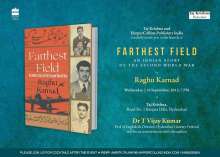

Pankaj Mishra, New York Times Book Review I wasn't prepared for its extraordinary aesthetic qualities and emotional power, as well as its serene mastery of outsize, intransigent material.” “Raghu Karnad's Farthest Field seemed at first to me a worthy new book, filling up the large blanks in the hegemonic Anglo-American view of World War II, part of a necessary excavation of suppressed and ignored histories. Simon Winchester, New York Times Book Review “ is an exquisitely written memoir of the wartime lives of the young Indian journalist's grandfather and two great-uncles, and is so heart-stoppingly beautiful I want all around to read it.” "synopsis" may belong to another edition of this title. It carries us from Madras to Peshawar, Egypt to Burma―unfolding the saga of a young family amazed by their swiftly changing world and swept up in its violence. In riveting prose, Karnad retrieves the story of a single family―a story of love, rebellion, loyalty, and uncertainty―and with it, the greater revelation that is India’s Second World War.įarthest Field narrates the lost epic of India’s war, in which the largest volunteer army in history fought for the British Empire, even as its countrymen fought to be free of it. Yet India’s extraordinary role has been concealed, from itself and from the world. The years 1939–45 might be the most revered, deplored, and replayed in modern history.

Bobby’s pursuit would carry him as far as the deserts of Iraq and the green hell of the Burma battlefront. Manek, dashing and confident, was a pilot with India’s fledgling air force gentle Ganny became an army doctor in the arid North-West Frontier. Then he learned about the Parsi boy from the sleepy south Indian coast, so eager to follow his brothers-in-law into the colonial forces and onto the front line. One of them, Bobby, even looked a bit like him, but Raghu Karnad had not noticed until he was the same age as they were in their photo frames. Indians had never figured in his idea of the war, nor the war in his idea of India.

They had all fought in the Second World War, a fact that surprised him. The photographs of three young men had stood in his grandmother’s house for as long as he could remember, beheld but never fully noticed. A brilliantly conceived nonfiction epic, a war narrated through the lives and deaths of a single family.


 0 kommentar(er)
0 kommentar(er)
